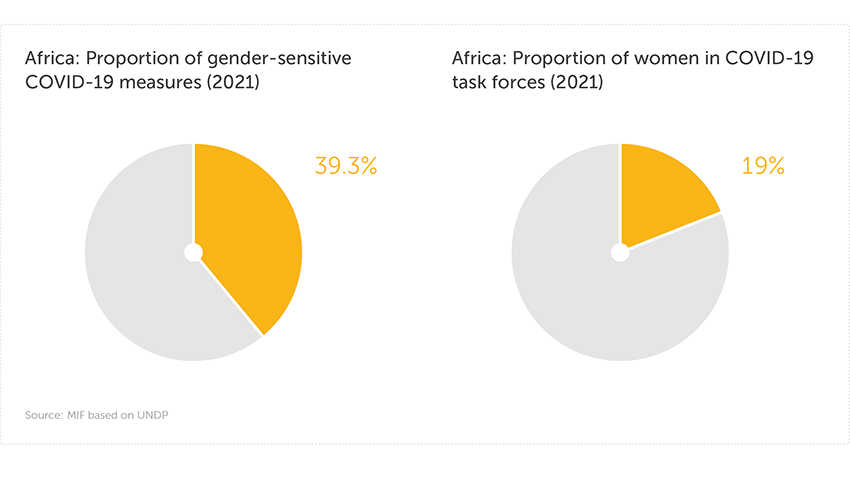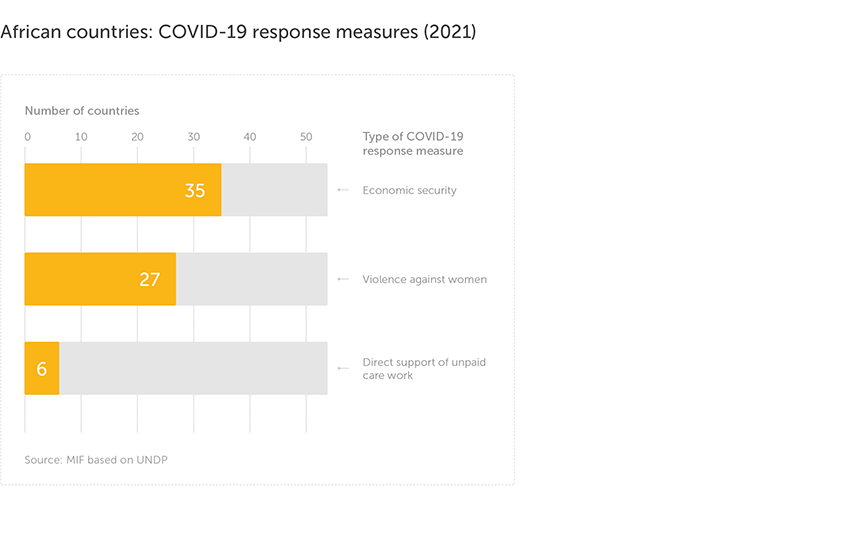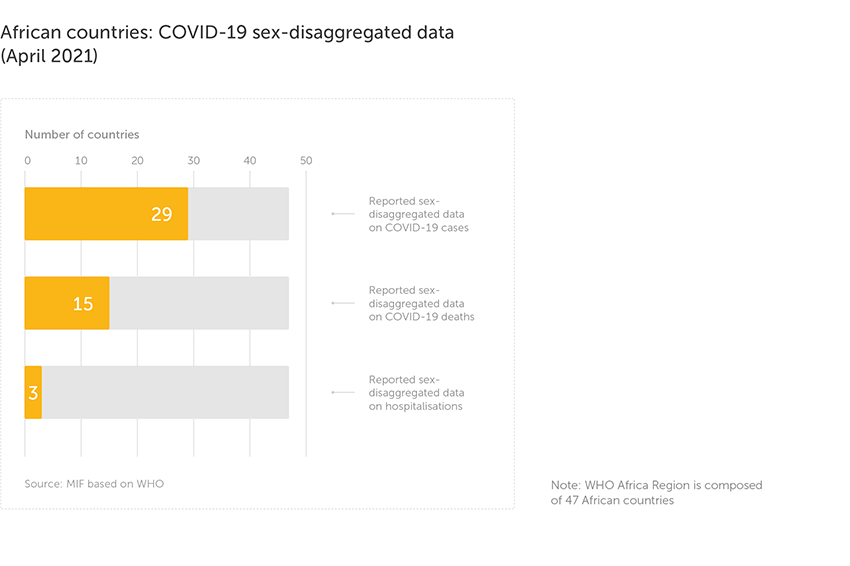

Spotlight 4: COVID-19 and gender: how better data can drive a more inclusive recovery
By Ines Schultes, Senior Researcher
In recent years, there has been notable progress in gender equality across the African continent. The 2020 Ibrahim Index of African Governance (IIAG) shows that between 2015 and 2019, the Gender sub-category followed a positive trajectory, due to increasing progress in the political power and representation of women and in their access to public services. But that progress is being put at risk by the impacts of COVID-19 as the pandemic has severe consequences on women’s health, economic and social wellbeing.
Gender equality might be pushed back a generation by COVID-19
During the 2021 Ibrahim Governance Weekend, Amina J. Mohammed, United Nations Deputy Secretary General, warned that gender equality might be pushed back a generation. The consequences of the pandemic for women and girls are likely to be aggravated by the intensification of existing vulnerabilities and inequalities, meaning that those in rural areas, of lower socioeconomic status or with disabilities are likely more impacted.
The 2021 Ibrahim Forum Report, assessed the impact of COVID-19 in Africa one year on and identified several threats to gender equality on the continent:
-
Girls are at higher risk of dropping out of school and less likely to benefit from remote learning. This means school closures due to COVID-19 risk widening the pre-existing gender gap in education.
-
Women are severely impacted by the economic and financial consequences of the pandemic, with approximately 92% of sub-Saharan African women working in the informal sector and with very limited social protection.
-
Food security is a major challenge for women and girls due to decreasing incomes. The closure of markets, as well as socio-cultural practices in households impact the quality and quantity of food they consume during crisis situations such as COVID-19.
-
Women have taken on more additional unpaid domestic care work than men.
-
COVID-19 is expected to reverse progress in maternal care and childcare, as maternal, child, sexual and reproductive health services are more restricted.
-
Stay-at-home orders and reduced access to support and emergency services have exposed girls and women to increased levels of sexual and gender-based violence (SGBV).
Gender-responsive policies and disaggregated data are still lacking
Gender often remains side-lined in African countries’ COVID-19 mitigation measures. According to UNDP’s COVID-19 Global Gender Response Tracker, about 80% of African countries (43 of 54 countries) have established at least one gender-sensitive measure in their COVID-19 response. But of the total 539 COVID-19 measures across the continent, less than half (39%) are gender-sensitive. Only Asia has a lower proportion of gender-specific COVID-19 policies (37%). Africa also has the second lowest representation of women in COVID-19 task forces, as measured globally (19%).

Most African countries (35) have put in place response policies that target women’s economic security, with Egypt having the most (9), followed by Nigeria, Senegal and South Africa (6 each). 27 countries have policies that address violence against women, with Egypt (12), Ethiopia (11), Uganda and Zimbabwe (9 each) having the most. Only six countries on the continent, Algeria, Angola, Burundi, Cabo Verde, Egypt and Seychelles, have put policies in place that directly support unpaid care work.
Research Spotlight series
A new series exploring data and key findings from the 2021 Ibrahim Forum Report.

Gender-sensitive measures address gendered risks and challenges caused by COVID-19. In the UNDP tracker, these risks include: (i) violence against women and girls, (ii) women’s economic security, and (iii) unpaid care work.
Data is key to properly informing the design of recovery policies. However, sex-disaggregated data on the impact of COVID-19 on women is still often lacking. By April 2021, only 29 of the 47 African countries (62%) in the WHO Africa region had reported sex-disaggregated data on confirmed COVID-19 cases. Only 15 countries reported sex-disaggregated death data and only three reported hospitalisation data by sex. Less than half the countries that disaggregate data by sex also disaggregate by age. Furthermore, no data is available for other vulnerabilities such as socio-economic situation, urban-rural location, ethnicity, disabilities, migration, refugee or displacement status.

Data assessing secondary impacts of the pandemic are often outdated and not updated regularly. This includes data on job losses, domestic violence or unpaid care work. The reliance on phone surveys to understand COVID-19 impacts also disproportionately excludes women, especially those most vulnerable and most at need of social assistance.
A recovery that includes women can bring back gender progress
The impact of COVID-19 is an opportunity for the continent to ‘build back better’, and this applies to gender too. Only a COVID-19 recovery that includes women and considers the full spectrum of gender-specific vulnerabilities can succeed in sustaining the positive gains of the past five years. The continent should adopt a gender-mainstreaming approach to its COVID-19 recovery plans, ensuring that the policy implications for women are considered. Such an approach should include more women in decision-making and leadership positions, as this can boost response measures supporting gender equality. It will also require a greater focus on data disaggregation, not only on sex but also on other related vulnerabilities.